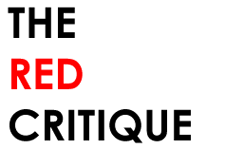
For a Materialist History of "Theory"
Robert Faivre
13
YXZ of Capitalism
Materiality in Contemporary Cultural Theory
Stephen Tumino
Supply-Chain Democracy and the Circuits of Imperialism
Rob Wilkie
Class, the Digital, and (Immaterial) Feminism
Jennifer Cotter
The Imperial Eye: Textualist Visuality and Class
Kimberly DeFazio
TEXT AND CLASS
Class and the Global Food Crisis
The Red Collective
IMAGE AND IDEOLOGY
BOOKS RECEIVED
In his article, "Why Today's Publishing World Is Reprising the Past" (The Chronicle of Higher Education, 13 June 2008), Jeffrey Williams, an academic journalist and editor who mostly interviews celebrity academics and reports on the popular tendencies in the academy, exceeds the superficiality for which he is well-known and offers a genealogy of theory that is more pop culture than serious analysis of recent "theory."
His article ostensibly gives an account of the state of theory today. Actually, however, it is a tissue of ideology aimed at trivializing the place of theory in social struggles by "explaining" (away) its historical development in terms of effects of larger social forces (e.g., publishing practices) and in doing so diverts attention from the material causes. Williams' report on theory today simply fleshes out the talking points of the conservative academy now most clearly articulated by Stanley Fish.
Theory is part of social practices and as such its historical developments are effects of changes in larger social forces and relations. The rise of theory (which Williams parochially interprets as "poststructuralism") in the late 1950's and early 1960's was the effect of the struggles of labor and capital. In its fight against workers and trade unions that had obtained decent wages and benefits for the workers after the war and thus had increased the cost of production which cut into capital's profits, capital needed a cultural commonsense that could justify its ruthless undercutting of workers' claims and their cultural legitimacy. "Theory" (i.e., "poststructuralism" and its derivatives) produced concepts and interpretive strategies that discredited all concepts and arguments that supported workers' causes. "Theory" textualized binaries and with it made the idea of "class" seem like a relic of metaphysics, it valorized the idea of "singularity" and heterogeneity and thus undercut collectivity, it emphasized the indeterminacy of language and in doing so demolished grounds for social struggles to end exploitation, and it turned history itself into a form of writing. In short, theory arose because it was a material force in the fight of capital against labor and provided the interpretive environment in which the collapse of Fordism and the rise of Postfordism and neoliberalism were seen as cutting-edge reality and the dawn of a post-labor capitalism of knowledge and immaterial labor.
Today, capital no longer needs theory in its traditional (poststructuralist) sense. It has triumphed over labor. What capital needs today is a different cultural commonsense, one that can represent its brutal treatment of the conquered global working class as compassionate, democratic, and caring. Instead of "theory" as critique (of logocentrism which helped capital to demolish all conceptual analysis opposed to it), it needs affective songs of compassion and empathy. Theory has not declined or gone away: it has assumed a new historical form. Instead of abstract conceptual interpretation, it now writes itself as blank verse—a poetry without poeticity. Instead of Of Grammatology, therefore we have Of Hospitality—a text that in the name of care-ing for the immigrant, obscures his identity as a worker.
Having obscured the laborer and her labor in his mapping of trajectories of theory in the 1950's and 1960's, Williams completely erases labor in his conclusion when he displaces productive "labor" with service "work" (as in "academic labor").
"Theory" is a structural feature of all class societies because the owners always need discourses by which they make their own economic interest universal and part of cultural values. Labor has, of course, its own contesting theory but my focus here is on the dominant theory because that is what Williams regards to be THE theory. To put it more directly, capitalism always needs a "theory" to normalize its labor relations. Theory today is therefore as active as ever; its tasks have changed and with it its vocabularies and topics. The particular form that "theory" takes at any historical moment is an effect of class relations at that moment. Publishers, therefore, publish, teachers teach, and readers read (always) class (as "theory"). To say it differently, theory is a structure of concepts which are themselves "abstractions of the social relations of production."